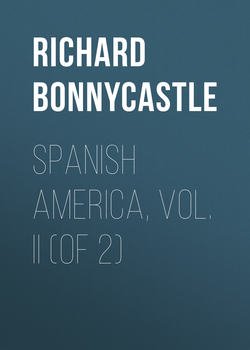Читать книгу Spanish America, Vol. II (of 2) - Bonnycastle Richard Henry - Страница 4
CAPTAIN-GENERALSHIP OF CARACCAS
DISCOVERY AND HISTORY
ОглавлениеThe coast of this country was originally discovered by Columbus in 1498, during his third expedition. Several adventurers succeeding in exploratory voyages on this part of the continent, the Spanish government came to the determination of endeavouring to place colonies on its soil. These being chiefly ill conducted, and managed by priests unacquainted with the manners and customs of the natives, did not succeed, and it was found necessary to endeavour to subdue the inhabitants by force. When this was partially effected, and Spanish settlers were placed in some security, the management of the new colonies was entrusted to the care of the Welsers, a German mercantile company. These people exercised, for a length of time, an uncontrolled sway over the unfortunate Indians and the colonists. Their excess of punishment and their fraud becoming at last notorious, the king of Spain deprived them of their power, in 1550, and appointed an officer of the crown to administer justice to the oppressed.
This office, under the title of captain-general of the Caraccas, has subsisted ever since, and with some few variations in the territorial divisions, and some abridgments of the authority of the person who fills it, it existed in the same form, until the year 1810. At this period, the mother country, subdued in part by the victorious arms of the French nation, had no time to attend to the situation of her transatlantic colonies. Engaged in destructive and terrible struggle herself, she little knew of the events which were taking place in the Americas, or if she did know them, was unable to assist those subjects devoted to her cause, or to quell the insurgent and ambitious. Taking advantage of the shackled state of the resources of Spain, the disaffected raised the standard of rebellion, and formed a junta suprema (a congress, or supreme council) in Caraccas. At first they published their acts in the name of Ferdinand the Seventh; but soon, however, on the arrival of Miranda with some troops, declared themselves independent of the mother country, and appointed Miranda to the chief command. Spain now placed their ports in a state of nominal blockade.
They have since been daily engaged in hostile measures, and junta has succeeded to junta, royal power to insurgent government, and vice versa, with little interval up to the present moment. The Caraccas may indeed be styled the focus of the Spanish American revolution. Numerous and bloody actions have taken place between the Spanish troops and the Caraccanians, Miranda has been beheaded, and the captain-general has reinstated himself.
Don Simon Bolivar, a native of the country, possessing much property and considerable influence, has been the great leader of this revolt, styling himself president and commander in chief of the united provinces of Venezuela. Obtaining from the congress of a neighbouring state (New Granada) an army of 600 men, he marched against Monteverde, the captain-general who had beheaded Miranda and punished his colleagues, and meeting with few obstacles to surmount entered the city of Caraccas as conqueror, on the 4th August, 1813. The captain-general fled, and refusing to treat with the insurgents, as derogatory to the honour of the master he represented, remained quiet until he received from Spain a reinforcement of 1200 men; he then attacked the city, but was repulsed with the loss of nearly his whole army, and himself severely wounded. In discussing the historical facts relating to South America in general, we have entered more at large upon this subject. At present Bolivar occupies the lower parts of the Orinoco, having made the town of Angostura his head-quarters.
We have chosen the description of the kingdom of Peru as the proper place to give detail of the general historical facts relating to the whole of South America, as it was in that kingdom that the Spanish government first took a consolidated form; we shall, therefore, at present recur to the metropolis, description, and political divisions of the captain-generalship we are now engaged in treating of.
